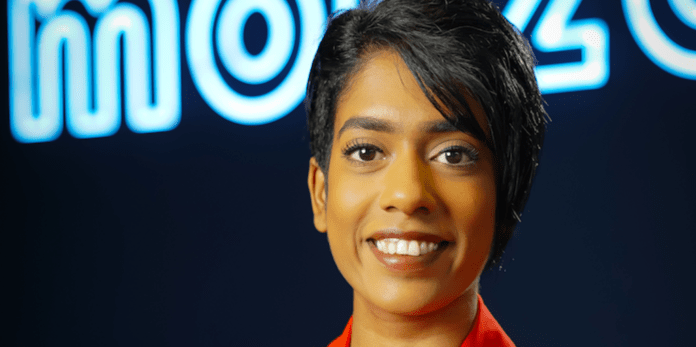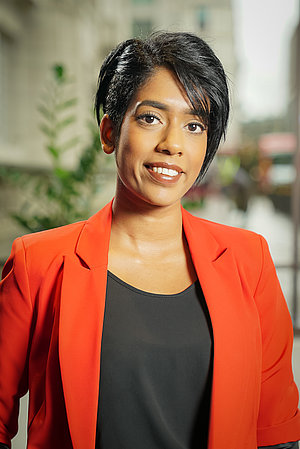Sheree Atcheson is 28 years old and has recently started her new job as Head of Diversity and Inclusion at the Fintech company Monzo. We met her right after her keynote at the DARWIN & MARIE conference and were immediately struck by her power and her passion about the topic of diversity.
Wow, you do so much. You’re not only working as Head of Diversity and Inclusion at Monzo, but also as Global Ambassador for Women Who Code and you also launched the initiative »I am Lanka«. How do you do it? Where does all the energy come from?
I have to find a balance, which sometimes I don’t. But I do it because I care and I do it because I am privileged enough. I don’t want to miss out on this important chance. That does not mean that I am probably more tired than I should be at the age of 28. It has much to do with prioritizing and juggling. And sometimes it is also about learning to delegate. But I have just signed a book deal (laughs), so I will be writing a book in the next nine months on what diversity and inclusion mean. But it is such a great opportunity, so I had to say yes.
And empowering people to engage in important things just like diversity also gives you a lot of power back …
Absolutely. And it is also about the importance of understanding that sometimes you are not the best person to do certain things, but that you might know someone who is. Sometimes you don’t have to be directly involved. My success is very much about the success of people that have done things that I am not directly linked to. But even playing one small part is incredibly empowering to me.
»I am used to being the only one and that ultimately changes how you are as a person.«
As I flicked through your CV, I saw that diversity has been an important issue for you almost since the beginning of your career. Was it being one of only a few women in the tech world that sparked off this great interest?
I am from Northern Ireland and was adopted when I was three weeks old, from Sri Lanka. So my parents are white. In Northern Ireland only two percent are from black, asian or other minority backgrounds. My brother is also adopted, which meant that in the small, rural village we are from, until we were about 12 or 13, we met no other people of colour. So I am very well accustomed to being the only one when I go into a room. Not only from a gender perspective, but also from an ethnicity perspective and certainly from a leadership and age perspective. I am very used to being the only one and that ultimately changes how you are as a person. When I became a software engineer, I worked at a local software company and I was one of two women in a team of nineteen and I wanted to do something about it. I couldn’t specify what I wanted to do at this point, but I knew that something has to be done. So I had a look and I found Women Who Code, which existed in a much smaller version back then. I launched the UK expansion and then helped across Europe and globally. I wanted to be part of something that is non-profit and has no price point, because I think that it is not right to do something that should help inclusion, but still do it in an exclusive way. We need to reach women from all backgrounds. That was very important to me as a person from a poor socio-economic background. So from there I started to do much about the topic of inclusion and it became clear that – even though I am a software engineer – that is my thing. There are many people out there who are much better software engineers than I am, but I think that there are not that much people out there who understand the topic of inclusion better than me. So I decided to make this my full-time career. And I am very privileged to have this leadership role and really make changes.
One of the big issues of our society is that it is mostly young white men who are programming the world we all will be living in? Do you think that this is changing right now? Also with initiatives such as Women Who Code?
I absolutely think so, there is definitely transitional change. But you can never expect organizational and societal transformation to happen over night. Even Women Who Code is an example of that. Six or seven years ago we had 5 000 global members and now we have 200 000. That hasn’t been coincidental, that is because the movement is growing. The way people are speaking about this is definitely amplified and empowering and getting more. And more and more companies are appointing people like me and decide to have a Head of Diversity and Diversity & Inclusion-Strategies that are hooked on to business goals and hiring goals. And that is really important, because that means that it is integrated into their businesses. I don’t think that we will get to a 50/50 gender ratio in the next three years, but I think that right now we are setting important steps to make this possible in the future.
What do you think are the main reasons that women are still so hesitant about tackling the tech world?
I think it is very difficult to want to be the minority in the room. The tech industry has a bias problem. And the tech industry is driven and influenced by society and society has systemic issues. Because there is a lack of role models, there is a lack of organizations that have processes in place to challenge these things. But it is important for businesses to learn that just because society does things one way, you don’t have to do it the same way. But society is changing. We can see that with toys for instance. Companies start to take that gendered lens off of things. That impact should not be underestimated.
»I made my own website when I was about eleven, it was about my dogs and there favourite treats«
What is it that fascinates you about the tech world?
I have a brother and there weren’t many girls around. We played video games and I got interested in these kinds of things. I made my own website when I was about eleven, it was about my dogs and there favourite treats (laughs). But even at that age I enjoyed making something. I did not like just using the computer but wanted to do something with it. At that age it felt like doing something that no one has ever done before – which wasn’t true of course. And then I became a software engineer and really developed things that never existed before.
Working at a Fintech company now, you entered a field where two very male dominated areas come to together.
Before I came along, Monzo already had an annual diversity report, so it has been an important issue before I joined the company. My role answers to the most senior person in the business, so I report directly to the CEO. I think that this is very important, because it shows that the topic is really prioritized. It was definitely a great move for me, because the company is part of the tech industry and I love how fast forward and high performing the brand is.
That’s great. And I think that one of the great dangers that lurks behind the »diversity-hype« is that companies simply appoint Diversity Managers to show that the topic is important to them, when in fact they don’t really care.
That wastes the time of the person and the time of the company. And is also a waste of money.
What are your experiences about being a young woman in a leadership position? Have you ever felt that you had to prove yourself more than your male colleagues?
Absolutely. As a young woman of colour in a senior role, the way that I am assessed is ultimately different. One of the things that I have become much more aware of in the last few years is my socio-economic background. When I was at school, it wasn’t such a big issue, but when you move into leadership you suddenly realize that many other leaders were educated in private schools and are from wealthy families. So they knew about things that I had no clue of. And this is also about small things. So I remember going to a gala and there were many different forks on the table and I did not know which one to use. That makes you feel other. I am turning 29 and most 29-year-olds don’t do what I do. That means that I often have to share a snippet of my CV, so that anyone would listen and acknowledge that I definitely know what I am talking about. That can be exhausting. And that is also why I moved to Monzo. I don’t have to do that there. They know that I am the expert in the room and they know that the need to listen. Being a senior leader now, I am very privileged to be listend to, I am financially stable and feel comfortable in any kind of circle, but I do a lot of self-reflection and reflect about my journey. This is also why I try to ensure that the new Sherees are able to be empowered and supported and become as comfortable as I am now. I was lucky to have some really good allies along that way. Now I am one of those allies.
DARWIN & MARIE is a conference dedicated to female leadership in technology, science and innovation. We will showcase and connect founders, CEOs and managers who foster innovation and diversity. It took place in Vienna on February 27th.
Alle Fotos © Monzo

